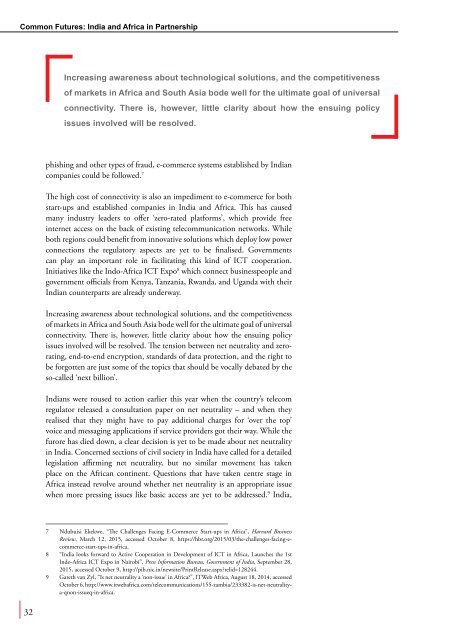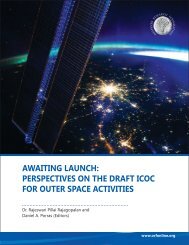Common Futures
II3UUw
II3UUw
You also want an ePaper? Increase the reach of your titles
YUMPU automatically turns print PDFs into web optimized ePapers that Google loves.
<strong>Common</strong> <strong>Futures</strong>: India and Africa in Partnership<br />
Increasing awareness about technological solutions, and the competitiveness<br />
of markets in Africa and South Asia bode well for the ultimate goal of universal<br />
connectivity. There is, however, little clarity about how the ensuing policy<br />
issues involved will be resolved.<br />
phishing and other types of fraud, e-commerce systems established by Indian<br />
companies could be followed. 7<br />
The high cost of connectivity is also an impediment to e-commerce for both<br />
start-ups and established companies in India and Africa. This has caused<br />
many industry leaders to offer ‘zero-rated platforms’, which provide free<br />
internet access on the back of existing telecommunication networks. While<br />
both regions could benefit from innovative solutions which deploy low power<br />
connections the regulatory aspects are yet to be finalised. Governments<br />
can play an important role in facilitating this kind of ICT cooperation.<br />
Initiatives like the Indo-Africa ICT Expo 8 which connect businesspeople and<br />
government officials from Kenya, Tanzania, Rwanda, and Uganda with their<br />
Indian counterparts are already underway.<br />
Increasing awareness about technological solutions, and the competitiveness<br />
of markets in Africa and South Asia bode well for the ultimate goal of universal<br />
connectivity. There is, however, little clarity about how the ensuing policy<br />
issues involved will be resolved. The tension between net neutrality and zerorating,<br />
end-to-end encryption, standards of data protection, and the right to<br />
be forgotten are just some of the topics that should be vocally debated by the<br />
so-called ‘next billion’.<br />
Indians were roused to action earlier this year when the country’s telecom<br />
regulator released a consultation paper on net neutrality – and when they<br />
realised that they might have to pay additional charges for ‘over the top’<br />
voice and messaging applications if service providers got their way. While the<br />
furore has died down, a clear decision is yet to be made about net neutrality<br />
in India. Concerned sections of civil society in India have called for a detailed<br />
legislation affirming net neutrality, but no similar movement has taken<br />
place on the African continent. Questions that have taken centre stage in<br />
Africa instead revolve around whether net neutrality is an appropriate issue<br />
when more pressing issues like basic access are yet to be addressed. 9 India,<br />
7 Ndubuisi Ekekwe, “The Challenges Facing E-Commerce Start-ups in Africa”, Harvard Business<br />
Review, March 12, 2015, accessed October 8, https://hbr.org/2015/03/the-challenges-facing-ecommerce-start-ups-in-africa.<br />
8 “India looks forward to Active Cooperation in Development of ICT in Africa, Launches the 1st<br />
Indo-Africa ICT Expo in Nairobi”, Press Information Bureau, Government of India, September 28,<br />
2015, accessed October 9, http://pib.nic.in/newsite/PrintRelease.aspx?relid=128244.<br />
9 Gareth van Zyl, “Is net neutrality a ‘non-issue’ in Africa?”, ITWeb Africa, August 18, 2014, accessed<br />
October 6, http://www.itwebafrica.com/telecommunications/155-zambia/233382-is-net-neutralitya-qnon-issueq-in-africa.<br />
32








